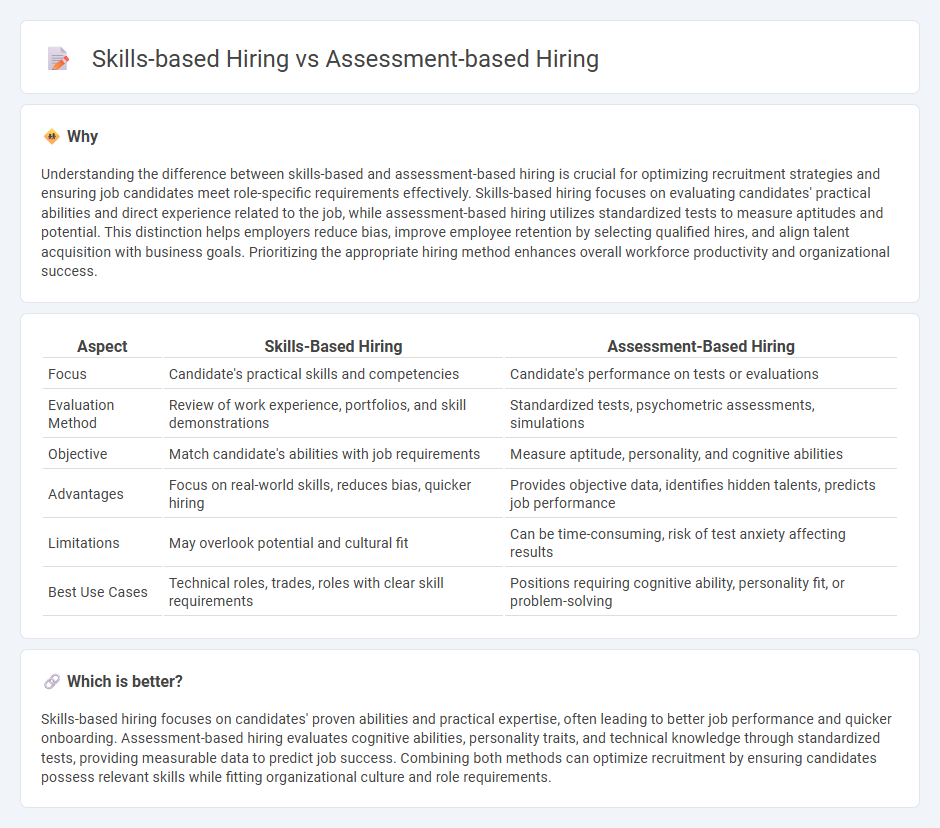
Skills-based hiring prioritizes candidates' practical abilities and relevant competencies directly tied to job performance, emphasizing tangible skills over formal qualifications. Assessment-based hiring employs structured tests and evaluations to measure candidates' aptitude, personality traits, and cognitive abilities, providing a data-driven approach to recruitment. Explore how these hiring strategies impact talent acquisition and organizational success.
Why it is important
Understanding the difference between skills-based and assessment-based hiring is crucial for optimizing recruitment strategies and ensuring job candidates meet role-specific requirements effectively. Skills-based hiring focuses on evaluating candidates' practical abilities and direct experience related to the job, while assessment-based hiring utilizes standardized tests to measure aptitudes and potential. This distinction helps employers reduce bias, improve employee retention by selecting qualified hires, and align talent acquisition with business goals. Prioritizing the appropriate hiring method enhances overall workforce productivity and organizational success.
Comparison Table
| Aspect | Skills-Based Hiring | Assessment-Based Hiring |
|---|---|---|
| Focus | Candidate's practical skills and competencies | Candidate's performance on tests or evaluations |
| Evaluation Method | Review of work experience, portfolios, and skill demonstrations | Standardized tests, psychometric assessments, simulations |
| Objective | Match candidate's abilities with job requirements | Measure aptitude, personality, and cognitive abilities |
| Advantages | Focus on real-world skills, reduces bias, quicker hiring | Provides objective data, identifies hidden talents, predicts job performance |
| Limitations | May overlook potential and cultural fit | Can be time-consuming, risk of test anxiety affecting results |
| Best Use Cases | Technical roles, trades, roles with clear skill requirements | Positions requiring cognitive ability, personality fit, or problem-solving |
Which is better?
Skills-based hiring focuses on candidates' proven abilities and practical expertise, often leading to better job performance and quicker onboarding. Assessment-based hiring evaluates cognitive abilities, personality traits, and technical knowledge through standardized tests, providing measurable data to predict job success. Combining both methods can optimize recruitment by ensuring candidates possess relevant skills while fitting organizational culture and role requirements.
Connection
Skills-based hiring and assessment-based hiring are interconnected through their focus on evaluating candidates' actual competencies and capabilities rather than relying solely on traditional qualifications like degrees or experience. Assessment-based hiring implements various tests and practical evaluations to measure specific skills, ensuring a more accurate alignment between job requirements and candidate abilities. This approach enhances workforce quality by prioritizing proven skills, increasing employee productivity and reducing turnover rates.
Key Terms
Competency Evaluation
Assessment-based hiring emphasizes evaluating candidates through standardized tests and practical exercises to measure their job-related skills and competencies. Skills-based hiring prioritizes specific technical abilities and experience relevant to the role, often validated through portfolios or certifications. Discover how competency evaluation bridges both approaches to enhance talent acquisition effectiveness.
Credential Validation
Assessment-based hiring emphasizes evaluating candidates through standardized tests and practical tasks to verify their skills and competencies, while skills-based hiring prioritizes the demonstration of relevant abilities regardless of formal qualifications. Credential validation in assessment-based hiring involves verifying educational degrees, certifications, and professional licenses to ensure authenticity and reduce hiring risks. Discover how integrating robust credential validation enhances hiring accuracy and workforce quality.
Practical Skills Testing
Assessment-based hiring emphasizes evaluating candidates through structured tests designed to measure practical skills and job-related competencies directly. Skills-based hiring prioritizes identifying specific capabilities and proficiencies relevant to the role, often through practical skills testing that simulates real-work scenarios. Explore how integrating practical skills testing enhances talent acquisition strategies by visiting our detailed resource.
Source and External Links
How Pre-Employment Assessments Redefined Skill-Based Hiring - Assessment-based hiring uses pre-employment tests to evaluate candidates on specific job skills, cognitive abilities, and personality traits, resulting in faster hiring, better retention, higher quality hires, enhanced candidate experience, scalability, and alignment with business goals.
How to Create Skills-Based Assessments for Hiring - Skills-based hiring involves assessing both hard and soft skills relevant to job performance, often replacing degree requirements by focusing on competencies, with over 55% of employers using such assessments to identify qualified candidates.
Skills-Based Hiring Starts Here - HiPeople Assessments - AI-powered assessment platforms enable fast, unbiased skills evaluation by offering numerous tests on hard skills, personality, soft skills, and cognitive abilities, helping employers efficiently identify top talent and improve diversity in hiring.
 dowidth.com
dowidth.com